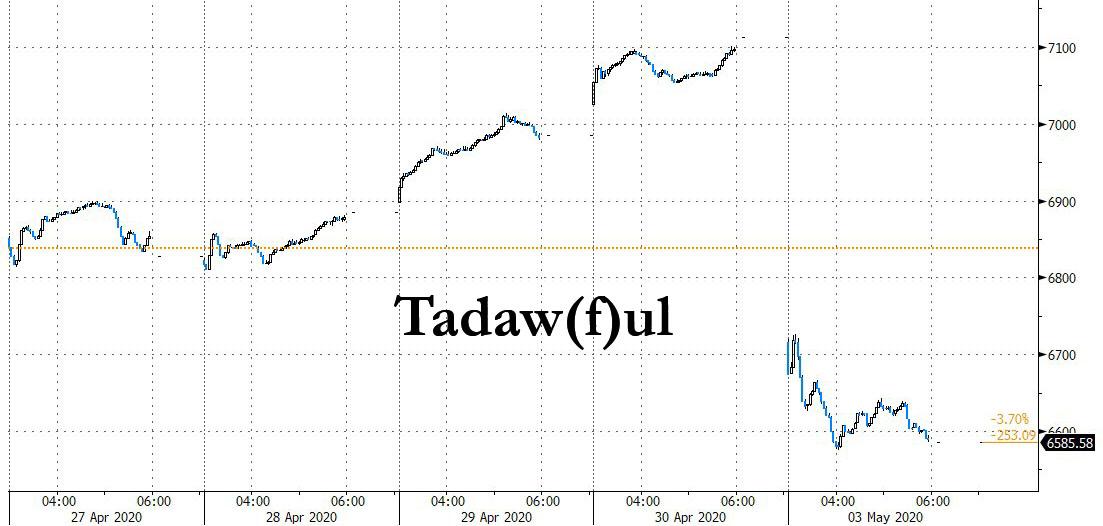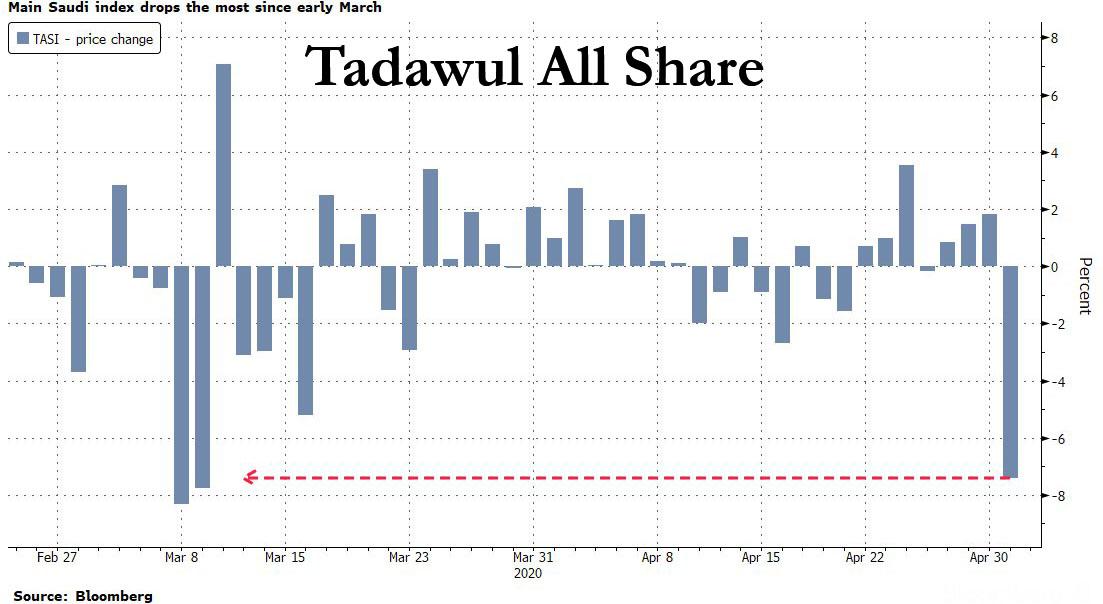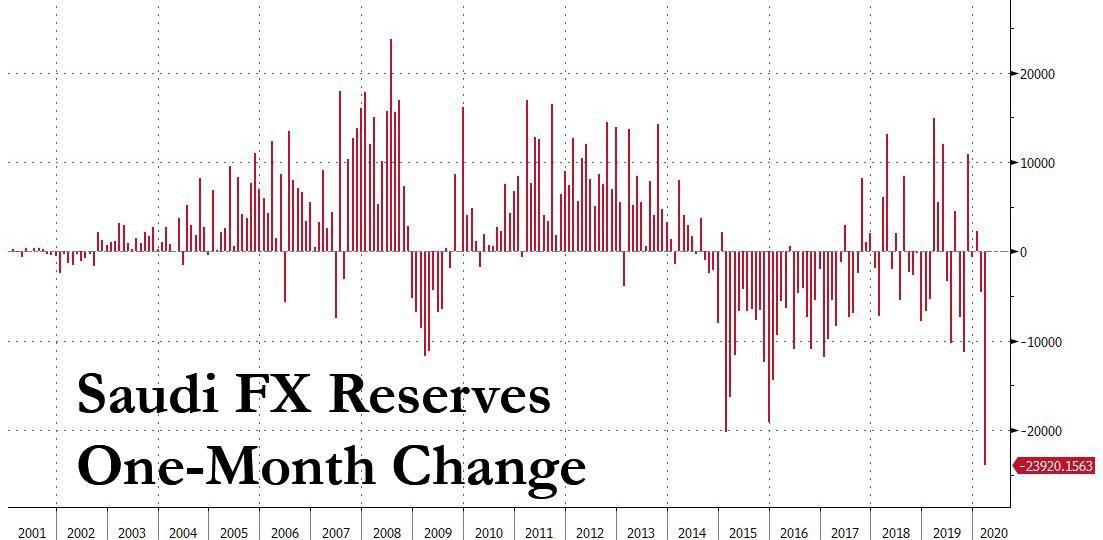Tadawful: Saudi Stocks Crash After FinMin Warns Of “Biggest Crisis In Decades”
It looks like the dead bat bounce is over.
Yesterday we cautioned that “Selling in May” may be a good risk strategy for 2020, and for traders in Saudi Arabia that warning is already being validated with Saudi stocks plunging the most in almost two months following a Moody’s outlook cut and the kingdom’s finance minister saying that “painful” measures including deep spending cuts, are needed to respond to the coronavirus crisis and crash in oil prices, while Saudi officials said a whopping 70% of Mecca’s population is already likely infected with the coronavirus.
One day after Warren Buffett surprised the videoconferencing Omaha pilgrims faithful when he said that he had dumped all his airlines holdings and was holding out for lower stock prices, the benchmark Saudi stock index, the Tadawul All Shares, closed down 7.4%…
… the biggest one day drop since the whole coronavirus crash started on March 9.
Saudi Aramco dropped by 5.2% to 30 riyals per share, while major lenders including Al Rajhi Bank, National Commercial Bank and Saudi British Bank plunged at least 6.7%.
It wasn’t just Saudi Arabia – where more than 100 Saudi stocks retreated between 9.5% and 10% – saw violent selling. Stocks in Kuwait, the United Arab Emirates, Qatar, Egypt and Israel also declined. In Dubai, 10 stocks including Deyaar Development, Damac Properties and Dubai Investments fell between 4.8% and 5%, the maximum allowed limit.
The Saudi selling was triggered after Finance Minister Mohammed Al-Jadaan, who is seen as “the voice of the Saudi government and leadership”, said in an interview with Saudi television station Al-Arabiya that the world’s biggest oil exporter hasn’t witnessed “a crisis of this severity” in decades, adding that government spending will have to be cut “very deeply”, something we touched on earlier. His comments, according to Bloomberg, were a sharp change in tone from more reassuring remarks he gave about the economy one week before.
Commenting on Al-Jadaan’s ominous warning, Yasin, from Al Dhabi Capital in Abu Dhabi said that Al-Jadaan “was a voice that brought back people to the reality that post-corona and the lower oil prices are here to stay for a while.”
“Investors also read that this is a signal that other Gulf governments will have to take a similar stance and therefore we saw negative reflection spreads to U.A.E. markets…. The question to many is: will the other economic activities recover substantially to help offset some of the drop in oil revenues in 2020, or will it stay muted in H2/2020 and therefore keep the pressure on spending this year and next at least?”
As a result, investors “took it as a warning of much higher spending cuts to come than the original 20%-30% expected earlier in the crisis.”
There were more bad news earlier, when on Friday Moody’s cut the government’s outlook to negative from stable due to ““increased downside risks to Saudi Arabia’s fiscal strength”, even as the rating was kept at A1 for now.
In addition to concerns about the local economy, and Buffett’s tongue-in-cheek warning that a second wave of selling is coming, there is also the specter of a new war of words between the US and China to worry about: “The smokescreen of another bilateral issue ahead between the U.S. and China over the origins of the coronavirus pandemic will pick up steam,” Jameel Ahmad, a markets analyst at FXTM in London, told Bloomberg.
In addition to a fiscal crisis, the Kingdom may soon be dealing with a funding crisis as well: the collapse in crude prices and the government’s drop in foreign reserves, which plunged by a record $27BN in March…
… is putting more pressure on the Saudi riyal. For now, however, prices for 12-month dollar-riyal forward contracts are well short of their all-time high reached in 2016. According to Goldman, a currency devaluation would be too costly for Saudi Arabia and the better option is to adapt to the oil shock through fiscal changes, although it is very much unclear how much demand there is for Saudi debt which isn’t and probably never will be backstopped by the Fed. Well, remove that “never” – there will come a time when the Fed will own everything.
Tyler Durden
Sun, 05/03/2020 – 15:56![]()
Zero Hedge’s mission is to widen the scope of financial, economic and political information available to the professional investing public, to skeptically examine and, where necessary, attack the flaccid institution that financial journalism has become, to liberate oppressed knowledge, to provide analysis uninhibited by political constraint and to facilitate information’s unending quest for freedom. Visit https://www.zerohedge.com


